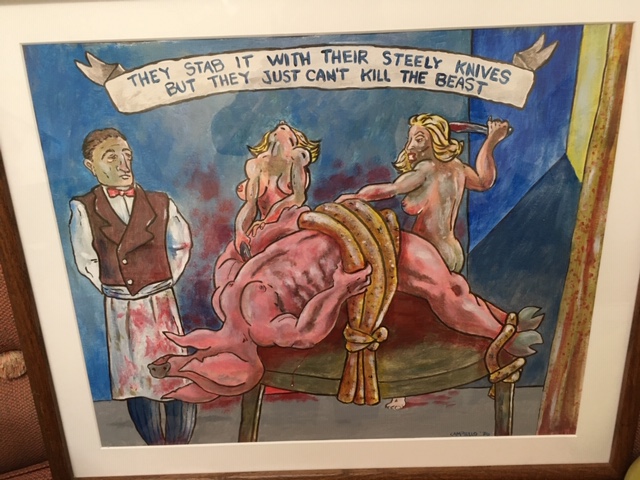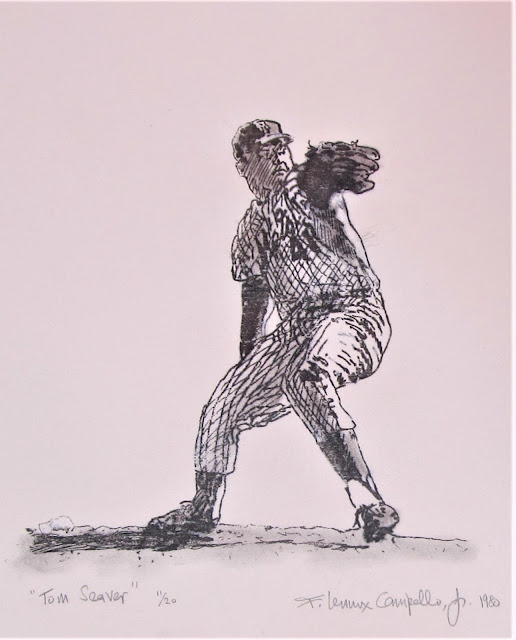I first proposed a version of this model about a decade ago, when there was (even then) a sense of art fatigue brewing in the art world.
In a post Covidian world, I suspect that a lot of people will still be a little leery of large group gatherings, and art fairs based on pre-Covidian standards may be a bit antiquated in the Brave Chickenized New World.
Herewith a revised Campello Art Fair Model
The important thing to remember, as I mull, chew, and refine a "new" art post-Covidian fair model to replace the existing pre-Covidian art fair model, which in its American incarnations seemed to work well only in Miami and New York, but not so well in the West coast (and as we DMV-based folks have seen with (e)merge and artDC, not at all in the capital region), is the marriage of a legitimate art entity (a museum) with an art-for-sale process as a means to raise funds.
The seeds for this model already exist in the DC region with the Smithsonian Craft Show, now in its third decade.
Considered by many to be the finest craft fair in the world -- and from the many artists that I have spoken to over the years -- one of the best places to sell fine crafts as well, this prestigious and highly competitive juried exhibition and sale of contemporary American craft usually takes place each April for four days. It takes place at the National Building Museum in Washington, DC and it includes one-of-a-kind and limited edition craft objects in 12 different media: basketry, ceramics, decorative fiber, furniture, glass, jewelry, leather, metal, mixed media, paper, wearable art and wood.
There were 120 exhibitors in last year's show, including emerging artists and master craftsmen, over 30 of whom were first-time participants. Twelve of those selected were also first-time applicants to the show. All were chosen by a panel of expert jurors from a highly competitive field of close to 1,400 applicants.
So we have a model for crafts in DC which has been working for over 30 years.
See where I'm going?
Can we envision the Smithsonian American Art Fair?
Or... The Smithsonian American International Art Fair?
The SAIAF would dramatically expand the business model of the Smithsonian Craft Fair to a National Mall-wide - outdoors - or even a citywide art fair anchored and guided by the Smithsonian Institution, and possibly either:
(a) spread throughout the various accommodating outdoor spaces at the various SI locales around the National Mall or even
(b) in temporary art spaces, booth, or containers on the open spaces of the National Mall itself!
The latter is not as big of a deal as it sounds.
The National Mall already hosts a spectacular variety of outdoor events on the Mall spaces where complex display spaces are temporarily built, secured and just as quickly dismantled, grass re-seeded, and by Monday the Mall is back to normal.
For art, all we need is protection from the weather and security. Perhaps even a combination of "free" (to the public) set of exhibitors (maybe out on the Mall) coupled with a paid admission set of exhibitors inside SI spaces -- or just make them all free to the public?
Details... details...
This new fair model would be open to both commercial art galleries and art dealers, as well as to art schools, and (and here's the key "and") to individual artists and cooperative artist-owned galleries.
Size matters.
Would 1200 galleries, dealers, schools and artists in a mega, new-model art fair raise some interests from art collectors to come to DC for a long weekend in May?
It would if it attracted 100,000 visitors to the fair instead of 10,000 (like the long gone art fair artDC attracted).
Are you aware that in May the Bethesda Fine Arts Festival in nearby Bethesda attracts 30-40,000 people to the streets of Bethesda for this artist-only street fine arts fair? or that also in May the Northern Virginia Fine Arts Festival attracts the same number of people to the streets of the Reston Town Center to buy art from individual artists?
Both Bethesda and Reston have two of the highest median household incomes in the US. And I am told that the Greater Washington, DC region has the second highest concentration of multi-millionaires in the world.
The money is here - the key is to get the disposable income crowd in touch with the art.
Both Bethesda and Reston manage to accomplish this one weekend each year. Do not, under any circumstances assume that these are "street fairs" where teddy bears, country crafts, and dried flowers are sold. These are both highly competitive fine arts outdoor fairs where artists from all over the nation come to and compete for spots because artwork sells well.
I have seen $80,000 worth of sculptures sell to one collector in Bethesda and a painter with a price point of $17,000 sell out in Reston.
Do not let the snobby attitude of the high art world affect your preconception of what these two street art fairs are like; go visit one this coming (and hopefully post Covidian) May and open your eyes.
And because of them, and because of the success of Art Basel Miami Beach, we know that given a certain critical mass, people will come out to an art fair. The primary key for art dealers to have interest in an art fair is sales (and also exposure to new collectors, museum curators, etc.), but mainly sales.
If you are a British gallery, by the time you get yourself and your artwork to Miami Beach, you're in the hole a whole bunch of Euros and British pounds; if you don't sell anything (like it happened to a British gallery in artDC and an Israeli gallery at another fair), chances are that you won't return to that fair.
But increase the public attendance numbers exponentially, and Economics 101 tells you that sales will also increase exponentially. And unlike the hotel-deprived artDC location at the Convention Center, I am told by DC's tourist gurus that the National Mall is already a magnet location where visitors, regardless of where they are staying around the Greater DC region, flock to during their visits to the capital.
Since two major Greater DC area street art fairs already exist in May in the Greater DC area, we can even consider aligning the weekends so that both Reston, Bethesda, and the The Smithsonian American International Art Fair all take place on the same weekend!
Offer free bus service between Reston and Bethesda and the National Mall for collectors to hop around during the fair weekend, and a public buzz alignment will begin to happen. The Smithsonian American International Art Fair starts on a Thursday through Sunday and both Reston and Bethesda continue to run on Saturday and Sunday. And the Smithsonian American International Art Fair is focused as a major fundraiser for the cash-hungry SI.
A formula of booth prices + perhaps a 5% commission on all sales (both tax deductible for American galleries) would take care of temporary Mall booth construction, re-seeding of grass, and booth construction inside SI venues and still yield a nice chunk of cash for the SI.
If there's commercial success and high public attendance, soon we'd see some satellite hotel fairs popping up all over DC and its easy-to-get-to suburbs; the Phillips will jump on the bandwagon right away.
ABMB had 26 fairs all over Greater Miami last December. Another DC-unique element to the above model, and an important element that only a Washington art fair weekend can add: include the Embassies!
In addition to all the above events taking place, the fair could also align with shows at 15-20 embassy galleries around DC. The embassies would showcase one (or a group) of their national artists, and then the fair would really have an international flavor, and the beginning seeds of an American Venice in the DMV.
DC is a small city; it's fairly easy to set up transportation between the embassies and the Mall. In fact, some embassies could probably set that up themselves.
I think that this "new" super model could (and eventually when someone delivers and implements it -- it will) challenge Miami Beach -- and yes, I am aware that DC in May is not Miami in December -- but I also think that the District's own museums and public attractions trump Miami's anytime, so the DMV has something different to offer the potential collector who may be considering attending a new art fair in a city (like DC) that also offers him/her some other cultural and visual attractions besides good weather and nice beaches and sexy Cubans.
DC art commisioners... Smithsonianos... DC city fathers and mothers.... call me!











